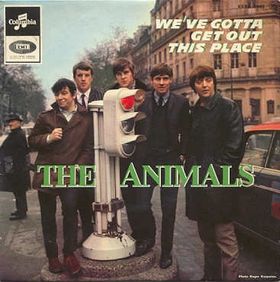Turn on, tune in, drop out. Reality is hard. The Animals understood just how hard, but encouraged people to eschew reality, and embrace the counterculture being fomented under the surface of a changing society, rather than facing it. In the ‘60s, widespread discontent with the older system, which had carried people through the end of the World War and into the 50s, was starting to cause cracks in a patina of social decency. Those in America saw that they had everything. Those in the ageing and superannuated empire that formally ruled the world saw nothing but a slow decline towards national decrepitude.
As the Vietnam War escalated, more of American’s youth were sent home in body bags or disfigured and disabled. While the song We Gotta Get out of This Place by The Animals was not written for the war, it became an anthem and rallying cry for those who wanted to leave other countries to their ends. While the same analogy became the song’s vision, it was, in reality, a locational allusion. The formally powerful industrial cities of the UK, such as Newcastle upon Tyne, had been losing their lustre. The cities were dirty, and the coal dust that covered everything even blotted out the sun.
People at the ageing cholesterol-filled and clogged industrial heart of England no longer believed in the future. As such, the singers remind us, “People tell me, there ain’t no use in tryin’”, and that those in the city had lost hope. One hundred years before, England was the powerhouse of the world. But now, like the singer’s father, the country was on its deathbed. England was once a strong and powerful nation, but now, after a lifetime as the strongest empire on earth, it lay awaiting the nurse as its power seeped out of its veins.
The singer wailed in the necessity for how “We gotta get out of this place!”. Even if it was the last thing they had to do, they needed to be away from the sickness and decay, slowly eating into the heart of their future. As youth, they were the promise of what was to come, but the weight of empires and the slow cancer of a dying society analogised both the despair in a future and a promise that could never be fulfilled and the vision of a world that was growing and vibrant in America. Modern technology is a bane and a curse as much as it is a way towards growth and renewal.
The industrial cities of England were now compared as a dark mirror image to the bright lights of American cities. Places where work is not so hard, where your hair does not turn grey before it’s time. Places where the coal dust does not seep into your lungs. Somewhere out there they could see shining against the darkness and despair, “… there’s a better life for me and you”.
Background
The song We Gotta Get out of This Place by The Animals was released twice, with some slight differences. It was included in the album House of the Rising Sun. While it was not written for the Vietnam War, it became the catchcry and anthem of the soldiers, vets, and protesters who remained home. At first glance, the song captured much of the spirit of the anti-war sentiment in America. At the same time, it was not about the American war, and it was not about American youth.
The misapprehension that led to the song being used as a catchcry came from those looking only to the immediate and not thinking about where it came from. The failing British Empire left a lot in its wake. The move back towards isolationism in the United States demonstrates the dichotomy and paradox between the two great empires and hegemonies. The English, in their youth and power, tried to bring culture to the world. The Americans did not see the necessity to help other nations.
Many in America looked at Vietnam as a place that was a long way away and had nothing to do with them. But what about the people in Vietnam? What about the obligations that come with power? In looking at such questions, it becomes necessary to think about what interactions and involvement peoples of different countries need to engage in and what obligations they have. Hegemonic power comes with obligation. Some countries have done well. None have ever done it perfectly or ever will. But to shirk duties or to remain in isolation is in itself part of the path towards decrepitude.
America became strong when it was involved. To become strong, it is necessary to exercise and to push ourselves to the limit. Building muscle requires that we constantly exercise. Equally, nations that isolate themselves and forget their role in the world start to become fat. Just as the athlete who no longer exercises goes from being muscular to becoming fat, so do countries that fail to exercise their power in helping and building other countries become weak. England was strong when it was engaged. It became weak and lost opportunities when it did not want to be part of the world.
Before World War II, Prime Minister Chamberlain had the opportunity to end the conflict before it would even start to develop. But, in seeking peace at all costs, the English people found war. Thus, isolationism seems like a good strategy in the short term. Yet, all good things take effort, and everything decays without work. Nations are no different. When we forget our part in the world, the world moves on and leaves us behind.

